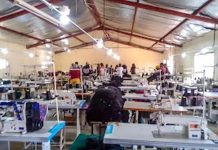Africa-Press – Lesotho. Lesotho is sometimes described as one huge supermarket for goods produced in neighbouring South Africa and elsewhere. But Motlatsi Shale, a food processing expert, is keen on changing that.
Shale says he is trying to break the status quo by harnessing the local food processing market whose potential has hardly been utilised. His interest in food processing started after he attended a seminar meant to equip youths with skills to fight the scourge of unemployment in 2015.
From the seminar, he began the journey into the food processing sector. “The youth shouldn’t despair when they are not absorbed by the labour market. Instead they should see it as an opportunity to work on their personal development in business.
In our days it was automatic to secure a job upon graduating from a tertiary institution but currently, the opposite holds,” Shale says. Despite being mocked by many who see it as a waste of time, education remains important, says Shale.
According to the businessman, young people should use their degree programmes or other tertiary education programmes as an opportunity to gain skills to be used in entrepreneurship instead of being preoccupied with the idea that they would find a job once they graduate.
Securing a job, for him, should be seen as a bonus and not a basis for undertaking a study in a certain area. For centuries, Basotho society have been deeply rooted in the belief that the kitchen is a woman’s place while men work in the fields to produce for the kitchen.
Shale realised that this gender stereotype isn’t ideal for the growth of society and men and women can make a collective contribution in the production and consumption of food items.
He made it an endeavour to research and engage in training to beef up his skills and meet the demands of the industry. In the process, he encountered an employee from the office of the then Prime Minister, Topollo Lephatšoe, who was working under a poverty reduction project.
Lephatšoe had spearheaded many projects that were meant to promote production, which included cutting and processing of sandstone, ‘motoho’ processing and packaging and making petrolium jelly from aloe.
Shale says Lephatsoe inspired him to focus more on production and processing of different items. When one talks about food processing, people tend to think of a tasty meal on the plate to intrigue their taste buds, However there is more to it other than the final treat.
The synthetic products that Shale makes and also train people on include sweets, chocolates, soups, sauces, spices, mayonnaise, cheese, pasteurised sour milk and biltong.
“We preserve the food that always go to waste but can be used over a long period of time.
Some foods and vegetables are seasonal so it’s a clever idea to preserve them during the season when they are found in abundance and not have to pay every time you would need them, thus saving money,” he says.
He says they preserve food using chemicals or natural methods such as dehydrating by sun drying. The chemical preservatives are safe to consume as they don’t contain poisonous substances that might render the food inappropriate to consume, Shale says.
He says it is more cost effective to produce using locally sourced raw materials instead of buying them from the shelves. “It’s very economical to produce things from scratch instead of just buying as there are many costs attached to the value of the goods such as transportation and insurance.
“The advantage of producing locally is that we are able to create employment domestically and the profits would be ploughed back, thereby ensuring that money circulates within the country.
” Local produce can also be exported to other countries which can enhance the economy through foreign earnings, he says.
“The raw materials we use for most of our products are readily available in our environment.
Like for sauces and spices, we use chillies and peppers that grow well in the country. However, there are ingredients which we have to import such as those used for making cheese.
” Shale expressed dismay that Lesotho continues to rely heavily on imports.
“I am tormented that we are solely the consumers and not producers of most of the products you see around. The level of dependency to meet our daily needs such as food is scary,” he says.
For years, Lesotho’s products have struggled to breach the export market due to lack of a standardising bureau and Shale has lauded the National University of Lesotho (NUL) for providing a facility to determine the quality of products before they are distributed to the market.
“This can be a new dawn for Basotho products that have always faced barriers due to lack of safety and quality assurance,” he says. A certificate of assurance that the body offers is instrumental in the growth of the business.
While food processing is not new to Basotho, for many who grew up in homesteads who were already engaged in food processing, skills such as labelling and packaging are still lacking, he says.
“What makes our products fall short compared to established products from other countries is labelling and packaging,” says Shale.
He describes his training methods as “hands on” and “more practical than theoretical”. “Anybody can follow the lessons, even those illiterate can cope as the end result is about production and not theoretical work.
So it caters for anybody from different backgrounds,” Shale says. One of the challenges faced by local producers is the negative mentality by traders and consumers alike, he says.
“As Basotho, we belittle our products and don’t have pride about them since we have been accustomed to the idea that everything we use should come from elsewhere and not locally. That mentality has bred a culture of undermining our production capabilities.
For More News And Analysis About Lesotho Follow Africa-Press






